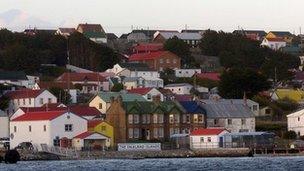Falkland Islands: Government rules out protection law
- Published

This April marks the 30th anniversary of the start of the Falklands War
The government has ruled out bringing in a UK law to ensure the Falkland Islands' right to remain British.
Tory MP Guy Opperman said legislation would show support for the "unambiguous right to self-determination".
But Foreign Office Minister Jeremy Browne said existing UN rules offered protection against ongoing territorial claims made by Argentina.
He also announced he would visit the Falklands for the commemoration of the 30th anniversary of the end of the war.
Fighting after the Argentinian invasion in 1982 led to the deaths of 649 Argentine and 255 British servicemen.
But Argentina continues to press its claim of sovereignty over the islands in the South Atlantic.
Tensions have increased recently, with the governments in London and Buenos Aires using stronger language.
Last week Prime Minister David Cameron said Argentina had a "colonialist" attitude to the Falklands, which it calls the Malvinas. This was condemned by Argentina's Senate.
'Paramount'
On Tuesday the UK government announced that it was sending the Type 45 Destroyer HMS Dauntless to the Falklands, describing this as a routine deployment.
This follows the Mercosur grouping of countries, which includes Argentina, Uruguay, Brazil and Paraguay, announcing that it would ban ships sailing under the Falkland Islands flag from docking at member nations' ports
Bringing a debate in Parliament's Westminster Hall, Mr Opperman, the MP for Hexham in Northumberland, condemned the actions, saying Argentina's behaviour had "no place in the 21st Century".
He added: "I would like a self-determination law, that all territories overseas have an unambiguous right to self-determination."
He went on: "I would say that overseas territories with a settled population have an unambiguous right to remain British and be protected from oppression unless they vote for secession."
Mr Opperman suggested this law should cover all UK territories including Anguilla, St Helena and Pitcairn.
He told his fellow MPs: "It would send out a strong message and signal from this country that self-determination for peoples, where they choose to remain part of Great Britain, is paramount."
During a sometimes impassioned debate, fellow Conservative MP Bob Stewart said the Argentinian government should be told: "Keep your hands off the Falklands. They are British and they are going to remain British."
'Sombre occasion'
Mr Browne, a Liberal Democrat MP, said the government felt "deep disappointment" at Argentina's imposition of a "trade blockade" via the shipping restrictions.
He added that he and colleagues had been "extraordinarily active" in protecting the islands' interests.
However, he said the right of peoples to self-determination was enshrined in Article 1.2 of the United Nations Charter and the International Convention on Civil and Political Rights, as well as the Falklands' own constitution.
Mr Browne added: "So the British government already has a legal obligation to uphold both the principle, and the practical consequences, of self-determination. So we do not see the need to do additional work in this area."
Most Falkland Islanders wish to retain British sovereignty, and 14 June is marked as Liberation Day in the capital Port Stanley.
Mr Browne promised to visit to commemorate the 30th anniversary, adding that it would be "an important and sombre occasion".
Britain has held the islands since the 1830s, but Argentina insists it has a prior claim.
Washington has called on Britain and Argentina to negotiate but the UK government has said it is "not prepared to discuss the sovereignty of the Falkland Islands against the wishes of the Falkland people".
- Published31 January 2012
- Published25 January 2012
- Published21 January 2012
- Published19 January 2012
- Published18 January 2012
- Published11 November 2011
- Published17 June 2011